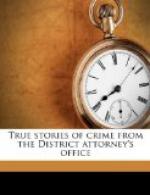“You think Mr. Rice will be able to go down Monday morning?” Patrick asked.
“You had better wait until Monday morning comes,” replied Dr. Curry.
“Do you think he will be able to go down town next week?” persisted the lawyer.
The doctor answered in the affirmative.
That night Mr. Rice slept quietly until eight o’clock Sunday morning. Dr. Curry called and found him in excellent condition, having eaten a hearty breakfast. His heart was a trifle weak, but it was sound. His organs were all working normally; he felt no pain. The doctor left without prescribing any medicine, stating that he would not return unless called, and expressing his opinion that the patient would recover. This was about eleven o’clock, and Jones immediately hastened to Patrick’s house and reported the conversation.
It was clear that Rice’s death would not occur before Monday morning. He might live to pay over the two hundred and fifty thousand dollars; long enough to give further testimony in the Holt litigation, and thus expose the whole fraudulent scheme of pretended settlement and of friendly relations with the lawyer, and finally, perhaps, even to make a new will. The success of the conspiracy demanded that Rice should die that night. Did he die naturally? Was his death caused by any further act of the conspirators? Did Jones kill him by means of chloroform?
Jones’s story is that Patrick supplied him with some oxalic acid which was to be mixed with powdered ammonia and diluted in water, on the theory that it was preferable to chloroform since it would not require Jones’s presence in the room at the moment of death. Jones said that he endeavored to administer the mixture to the old man, but that he refused to take it. Jones had already procured the chloroform from Texas, as has been stated, and had turned it over to Patrick. He says that that afternoon he procured this from Patrick, who told him how to administer it. This was a few moments after six o’clock. Rice was sleeping soundly. The colored woman who did the housework was absent for the day and the rooms were deserted. He saturated




